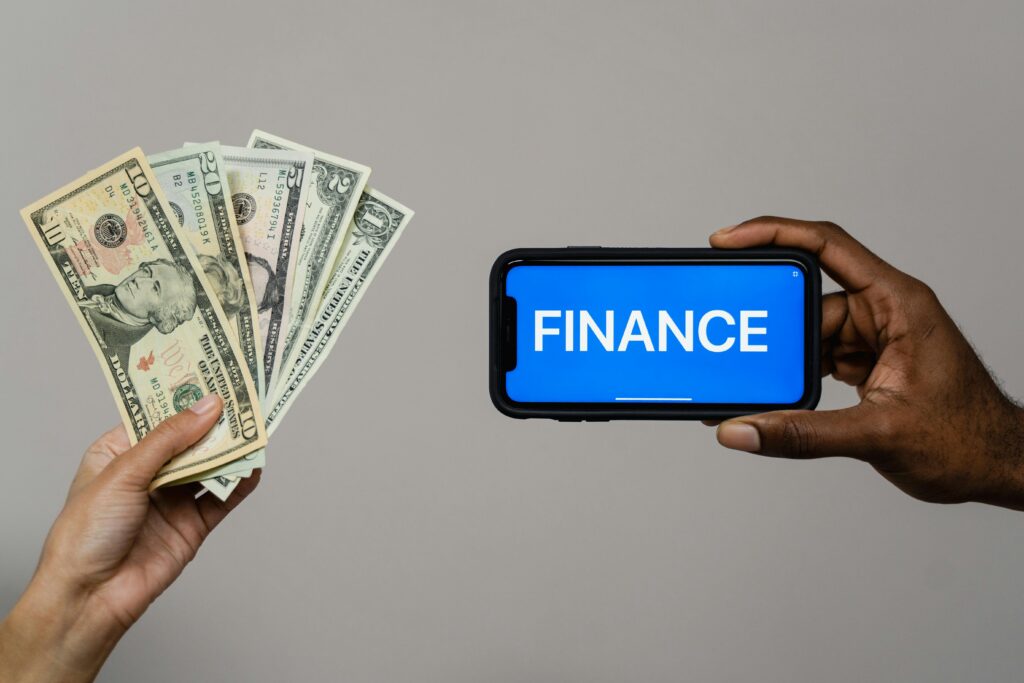How To Improve Your Money Mindset: 9 Money Mindset Tips

Let me be real with you for a second: most of us weren’t taught how to think about money properly.
We were told to get a job, pay our bills, and somehow hope things work out.
Spoiler alert: that’s not exactly a winning strategy.
Here’s the thing I’ve learned after years of studying finance (yeah, I’ve got the fancy degrees to prove it): making money isn’t actually the hard part.
The hard part? Keeping it and growing it.
Not panicking when unexpected expenses pop up.
That all comes down to your money mindset.
Your relationship with money is basically like any other relationship; it needs work, honesty, and the occasional reality check.
If you’re constantly stressed about finances or wondering why your bank account stays stuck at the same disappointing number, chances are your money mindset needs a serious upgrade.
Ready to fix that? Let’s jump in.
What Is A Positive Money Mindset?
Think of your money mindset as the mental software running your financial decisions.
It’s the collection of beliefs, attitudes, and habits you have about earning, spending, saving, and investing.
A positive money mindset doesn’t mean thinking you’ll magically become a millionaire overnight (that’s just wishful thinking, friend).
It means having a healthy, realistic, and empowered perspective about your finances.
It’s believing you can improve your situation while also being honest about where you’re starting from.
Here’s what blows my mind: two people can earn the same salary, but one builds wealth while the other stays broke.
The difference? Their money mindset. One person sees opportunities and makes strategic moves.
The other sees limitations and makes emotional decisions. Your beliefs about money literally shape your financial reality.
If you constantly tell yourself, “I’m just bad with money,” guess what? You’ll keep proving yourself right.
But if you shift that narrative to “I’m learning to manage money better every day,” you’ll start seeing actual progress.
How Do You Create A Money Mindset?
Creating a solid money mindset isn’t some mystical process; it’s actually pretty straightforward (though I won’t lie, it takes effort).
First step: Get brutally honest with yourself. Sit down and really examine your current money beliefs.
Where did they come from? Your parents? Society?
That one financial disaster you went through. Write them down. All of them.
Even the embarrassing ones.
Second step: Identify which beliefs are helping you and which ones are sabotaging you.
For example, “I need to save for emergencies” is helpful.
“Rich people are greedy, so I shouldn’t want money” is absolutely holding you back.
Third step: Start replacing the trash beliefs with better ones.
This isn’t about affirmations and vision boards (though if that’s your thing, go for it).
It’s about actively changing your thoughts and behaviours around money.
Here’s a practical example: Maybe you grew up hearing “money doesn’t grow on trees.”
That scarcity mindset probably makes you anxious about spending even when it’s necessary.
Replace it with “money is a tool I can learn to use wisely.”
See the difference? One makes you fearful; the other makes you empowered.
You’ve also got to surround yourself with the right information.
Read books about personal finance.
Listen to podcasts.
Follow people who actually know what they’re talking about (not just Instagram influencers showing off rented Lamborghinis).
The more you expose yourself to healthy money conversations, the more your mindset shifts.
Does Your Money Mindset Have Any Impact On Your Finances?

Oh boy, does it ever. Your money mindset isn’t just some fluffy self-help concept; it directly affects your wallet in measurable ways.
Think about it: if you believe you’re destined to be broke, you probably won’t bother learning about investing or looking for better job opportunities.
You’ll accept whatever scraps come your way because that’s what you think you deserve.
On the flip side, someone with a growth-oriented money mindset actively seeks ways to increase their income. They negotiate their salary.
They start side hustles. And they invest in their skills.
Same starting point, completely different outcomes.
I’ve seen this play out countless times.
Two friends graduate with the same degree, same debt load, same entry-level salary.
Fast forward five years, and one is comfortably building wealth while the other is still drowning in credit card debt.
The difference isn’t luck, it’s mindset.
Your money mindset also affects how you handle setbacks. Lost your job?
A person with a scarcity mindset might spiral into panic and make desperate decisions.
Someone with a healthy money mindset stays calm, taps into their emergency fund, and creates a strategic job search plan.
Which person do you think bounces back faster?
The Importance Of Having A Good Money Mindset
Let’s cut through the fluff: you can have the best budget template in the world, read every finance book ever written, and still struggle financially if your mindset is messed up.
Your money mindset is literally the foundation of your entire financial life.
Everything else, budgets, investments, savings strategies, is just tools.
And tools are useless if you don’t have the right mindset to use them properly.
I compare it to fitness. You can join the fanciest gym, hire a personal trainer, and buy all the supplements, but if you don’t believe you can get in shape, you’ll quit after two weeks.
Same deal with money. You need that internal belief system working for you, not against you.
Having a good money mindset also protects you from self-sabotage.
Ever notice how some people always find a way to blow through any extra money they get?
Bonus at work? Gone in a week. Tax refund? Instantly spent. That’s mindset issues right there, specifically around what they believe they deserve or can handle.
A solid money mindset also gives you clarity. Instead of making emotional spending decisions, you make strategic ones.
Instead of avoiding your bank balance (we’ve all been there), you face it head-on. In place of feeling helpless about your finances, you feel empowered to change them.
9 Key Tips To Create A Positive Money Mindset
Alright, enough theory. Let’s get into the actual strategies that’ll transform how you think about money.
1. Let Off Your Past Financial Mistakes

Look, we’ve all made dumb money decisions.
I once bought a gym membership I used exactly twice.
My friend dropped $3,000 on a “business opportunity” that was basically a pyramid scheme.
These things happen.
The problem isn’t the mistakes themselves; it’s carrying around that financial shame like a backpack full of bricks.
That guilt and embarrassment? It’s not motivating you to do better.
It’s just keeping you stuck. Here’s what I want you to do: forgive yourself. Seriously.
Whatever financial disaster you’re still beating yourself up about, let it go.
You made a mistake.
You learned from it (hopefully). Now move forward.
Practical exercise: Write down your biggest financial regret on a piece of paper.
Really feel that regret for a minute.
Then literally rip up the paper and throw it away. Sounds cheesy? Maybe.
But physical actions help your brain process emotional releases.
The thing about past financial mistakes is that they only have power if you let them.
That maxed-out credit card from five years ago?
The car loan you shouldn’t have taken?
The money you lent to a friend who never paid you back?
Those are all learning experiences, not life sentences.
Every successful person has financial skeletons in their closet.
The difference is that they used those mistakes as stepping stones instead of anchors.
You can too.
2. Understand Your Thoughts And Emotions About Finances
Most people are running on financial autopilot, making decisions based on emotions they don’t even recognise.
That’s a recipe for staying broke.
You need to become a detective of your own mind.
Start paying attention to how you feel when you think about money.
Does checking your bank balance make you anxious?
Does seeing friends succeed financially make you jealous or inspired?
Do you feel guilty when you spend money on yourself?
These emotional responses are clues.
They reveal your underlying beliefs about money and your worthiness to have it.
Try this: Keep a spending journal for one week.
But don’t just track what you bought, track how you felt before, during, and after each purchase.
You’ll start noticing patterns.
Maybe you shop when you’re stressed.
Probably, you avoid checking prices when you feel insecure.
Maybe you feel guilty after treating yourself.
Understanding these patterns is like having a map of your financial psychology.
Once you see the map, you can navigate better.
I’ll give you a personal example: I used to feel extremely anxious about investing.
Not because I didn’t understand it (I literally have a master’s in finance), but because I associated risk with potential loss, which tied back to childhood experiences of financial instability.
Once I recognised that connection, I could separate my emotional response from rational financial decision-making.
Your money emotions are valid, but they shouldn’t be the only thing driving your financial decisions.
Awareness is the first step to gaining control.
3. Don’t Compare Your Financial Status To That Of Others
This one’s tough in the age of social media, where everyone’s posting about their “humble” new BMW or their “little” vacation to the Maldives.
But comparison is genuinely the thief of joy, and the killer of your money mindset.
Here’s the reality check nobody talks about: you have no idea what’s actually going on with other people’s finances.
That friend flexing designer bags?
Could be drowning in credit card debt.
That, coupled with the perfect house?
Might be stressed about their massive mortgage.
Social media is a highlight reel, not a documentary.
People show you what they want you to see.
And comparing your behind-the-scenes reality to someone else’s curated performance is just setting yourself up for misery.
More importantly, everyone’s financial journey is different.
Someone who graduated debt-free with a trust fund has a completely different starting point than someone working three jobs to support their family.
Comparing these two paths is like comparing apples to spaceships; it makes zero sense.
Focus on your own progress.
Are you better off than you were last year?
Last month? That’s what matters.
Competition with yourself is productive. Competition with others is just exhausting.
Besides, chasing someone else’s definition of success means you’ll never be satisfied.
You’ll always be looking at the next person, the next milestone, the next thing to envy.
4. Build Good Money Habits

Your money mindset isn’t just about thoughts; it’s also about actions. And the best way to cement positive beliefs about money? Build habits that reinforce them.
Good money habits are like compound interest for your mindset.
They start small but build on each other over time. Eventually, they become automatic, and that’s when real change happens.
Here are some game-changing habits to develop:
- Automate your savings: Set up automatic transfers to your savings account right after payday. When saving happens automatically, you never have to rely on willpower or motivation.
- Review your finances weekly: Spend 15 minutes every Sunday checking your accounts, tracking your spending, and planning for the week ahead. This keeps you connected to your money instead of avoiding it.
- Wait 48 hours for non-essential purchases: See something you want? Wait two days before buying. This simple pause eliminates most impulse purchases and helps you distinguish between wants and needs.
- Track every dollar: Use apps like Mint or YNAB to see exactly where your money goes. You can’t improve what you don’t measure.
The beautiful thing about habits is that they reduce decision fatigue.
Once checking your budget becomes as automatic as brushing your teeth, it no longer feels like a chore. It’s just what you do.
Start with one habit. Master it. Then add another.
Trying to overhaul your entire financial life overnight usually leads to burnout and giving up.
Small, consistent changes beat massive, unsustainable ones every single time.
5. Build A Convenient Budget That Makes You Happier
Real talk: if you hate your budget, you won’t stick to it. It’s that simple.
Too many people approach budgeting like it’s a punishment.
They create these restrictive, joyless plans that eliminate everything fun, then wonder why they “fail” at budgeting after two weeks.
That’s not failure, that’s just a bad budget.
Your budget should be a tool that makes your life better, not worse.
It should help you spend money on what actually matters to you while cutting back on stuff that doesn’t.
Here’s how to build a budget you’ll actually use:
Start with your values. What matters most to you? Travel? Good food? Financial security?
Your budget should reflect these priorities. If travel is your thing, don’t allocate $20 per month for it.
Be honest about your priorities and budget accordingly.
Use the 50/30/20 rule as a starting point: 50% for needs, 30% for wants, 20% for savings and debt repayment.
Adjust these percentages based on your situation and goals.
Make it flexible: Life happens. Your budget should have room for unexpected expenses and occasional splurges.
Building in some wiggle room prevents you from completely abandoning your budget when things don’t go perfectly.
Try different budgeting methods until you find one that clicks.
Some people love zero-based budgeting. Others prefer envelope systems.
Some thrive with apps like Goodbudget or simple spreadsheets. There’s no “right” method, only what works for you.
Remember: a budget isn’t about restriction. It’s about intention.
It’s deciding in advance how you want to use your money instead of wondering where it all went at the end of the month.
6. Stop Having A Scarcity Mindset

A scarcity mindset is like wearing glasses that only let you see what you don’t have.
Everything looks like a problem, a limitation, or something you can’t afford.
This mindset is sneaky because it feels like realism.
“I’m just being practical,” you tell yourself.
But there’s a difference between being realistic and being limited in your thinking.
Someone with a scarcity mindset thinks: “I can’t afford that.”
Someone with an abundance mindset thinks: “How can I afford that?”
See the shift? One shuts down possibilities; the other opens them up.
Here’s the truth bomb: thinking there’s never enough becomes a self-fulfilling prophecy.
When you believe resources are scarce, you make desperate, short-term decisions.
You don’t invest in yourself because “I can’t afford it.”
Not negotiating your salary because “I should just be grateful to have a job.”
You stay stuck because scarcity thinking keeps you playing small.
An abundance mindset doesn’t mean being delusional about your finances.
It means recognising that opportunities exist, that money is a renewable resource, and that you can create more of it.
Practical shift: Instead of saying “I can’t afford it,” start saying “That’s not a priority right now” or “How could I afford this in the future?”
This small language change opens up possibilities instead of closing them down.
And look, if you genuinely don’t have enough to cover basics, the solution isn’t just “thinking differently”, it’s finding ways to increase your income.
Check out resources like side hustle ideas or FlexJobs for remote work opportunities.
But even while you’re working on increasing income, maintaining an abundance mindset helps you spot opportunities you’d otherwise miss.
7. Build Confidence
Financial confidence isn’t about knowing everything or never making mistakes.
It’s about trusting yourself to figure things out and handle whatever comes your way.
A lot of people avoid dealing with money because they feel incompetent.
They think “I’m just not good with numbers” or “I don’t understand this stuff.”
That lack of confidence becomes a self-imposed barrier to improvement.
Here’s the secret: financial confidence is built through small wins, not giant leaps.
Start with something manageable. Possibly it’s opening a high-yield savings account.
Maybe it’s negotiating one bill. Maybe it’s learning what a Roth IRA actually is
(spoiler: it’s not that complicated). Each small action builds your confidence muscle.
Celebrate these wins! Did you stick to your budget for a whole month? That’s huge.
Did you increase your savings by $100? Awesome. Did you finally understand the difference between stocks and bonds? You’re already ahead of most people.
Confidence also comes from education: The more you learn about personal finance, the less scary it becomes.
Read blogs, watch YouTube channels like The Financial Diet, and take free courses on Khan Academy. Knowledge really is power here.
Another confidence killer? Perfectionism. You don’t need to make perfect financial decisions; you just need to make better ones than you made yesterday. Progress, not perfection.
And here’s something I wish someone had told me earlier: it’s okay to ask for help. Talk to a financial advisor. Join online communities.
Ask questions. Not knowing something doesn’t make you stupid; refusing to learn does.
8. Trust In Your Ability To Make Money
This might sound obvious, but stick with me: you need to genuinely believe you can make money. Not hope. Not wish. Believe.
A lot of people have this weird mental block around earning potential.
They’ve accepted their current income as their permanent ceiling.
“This is just what people in my field make,” they tell themselves. Or “I’m lucky to have this job, so I shouldn’t ask for more.”
That’s victim mentality dressed up as humility.
The reality: you have multiple ways to increase your income.
You can develop new skills, switch jobs, negotiate raises, start side businesses, freelance, invest, or create passive income streams.
These aren’t pipe dreams; they’re strategies millions of people use successfully.
But none of these strategies work if you don’t first believe they’re possible for you.
I’m not talking about toxic positivity or manifesting money through crystals and affirmations (though you do you).
I’m talking about concrete belief in your ability to create value and exchange it for money.
Ask yourself: What skills do I have that people would pay for? What problems can I solve? What value can I create?
When you start thinking this way, opportunities appear that you previously wouldn’t have noticed.
Trust also means believing you can handle more money responsibly.
Some people unconsciously sabotage themselves when they earn more because deep down, they don’t trust themselves with it.
They’re afraid they’ll waste it, lose it, or somehow mess it up.
So, they never let themselves accumulate wealth in the first place.
If you recognise this pattern in yourself, it’s time to address it.
Start small, prove to yourself that you can handle managing $100 well, then $1,000, then more. Build that trust gradually.
9. Set Financial Goals
Goals without direction are just wishful thinking. You can’t improve your money mindset without clear financial targets to work toward.
Here’s why goals are crucial: they give you focus, motivation, and a way to measure progress.
Without them, you’re just randomly doing financial things and hoping for the best.
With them, every dollar you save or earn has a purpose.
Your financial goals should be SMART:
- Specific: Not “save money” but “save $10,000 for a house down payment”
- Measurable: You can track your progress
- Achievable: Challenging but realistic
- Relevant: Actually matters to you, not just what you think you “should” want
- Time-bound: Has a deadline
Break your goals into categories:
- Short-term (less than 1 year): Maybe building an emergency fund or paying off a credit card
- Medium-term (1-5 years): Perhaps saving for a car or a big trip
- Long-term (5+ years): Things like retirement, buying a home, or achieving financial independence
Here’s the key: write them down. Goals that live only in your head are way easier to ignore or forget. Put them somewhere you’ll see them regularly.
Review them monthly. Adjust as needed. Also, make sure your goals excite you.
If your financial goals feel like obligations rather than aspirations, you won’t have the motivation to pursue them when things get tough.
Use tools to track your progress. Apps like Personal Capital or even simple spreadsheets work great.
Seeing that progress bar fill up is surprisingly motivating.
And celebrate milestones! Reached 50% of your savings goal?
Do something small to mark it. Hit your debt payoff target?
Acknowledge that win. These celebrations reinforce positive behaviours and keep you motivated.
10. Appreciate All You Have (Bonus Tip)
Here’s something that sounds contradictory but is actually essential: be grateful for what you have right now while still working toward more.
Gratitude and ambition aren’t opposites; they’re teammates. You can appreciate your current situation while simultaneously striving to improve it.
In fact, this balance is what keeps you motivated without making yourself miserable.
A gratitude practice around money might look like this:
- Appreciating your current income: even if it’s not where you want it to be, it’s supporting you right Recognising your progress: comparing where you are to where you started, not where others are
- Valuing non-financial wealth: your health, relationships, skills, and experiences
Why does this matter for your money mindset? Because constant dissatisfaction creates desperation.
And desperate people make terrible financial decisions. They fall for get-rich-quick schemes.
Take on predatory loans. They overspend trying to fill an emotional void.
Gratitude creates contentment, which creates clarity.
When you’re not operating from a place of lack and desperation, you make smarter choices.
This doesn’t mean settling or giving up on your goals.
It means acknowledging that you’re already worthy, already enough, and already valuable, regardless of your bank balance.
Your worth isn’t determined by your net worth.
Practice this: Every day, write down three things you’re financially grateful for.
It could be as simple as “I can afford coffee today” or “My car still runs.”
This simple practice rewires your brain to notice abundance instead of only seeing scarcity.
Final Thoughts
Your money mindset is something you can shape and strengthen through consistent effort.
Real change takes time, but each small step builds lasting progress.
The goal isn’t to obsess over money it’s to create a balanced, confident relationship with it so you’re in control.
Your past doesn’t define your financial future; your actions do.
Start small, keep going, and remember progress, not perfection, is what matters.







